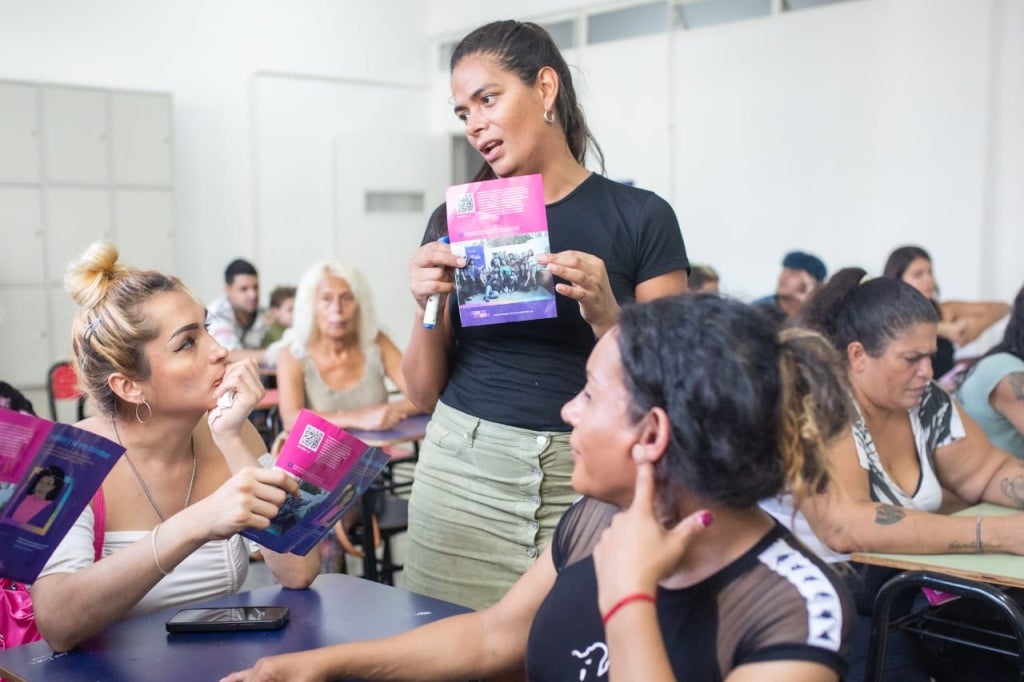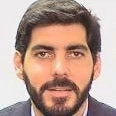 Two trans women looking at the front of the Mocha Celis Travesti-Trans Popular High School in Buenos Aires, Argentina.
Two trans women looking at the front of the Mocha Celis Travesti-Trans Popular High School in Buenos Aires, Argentina.
"Since I was young, I needed to abandon school due to insults, bullying, and violence against my gender identity." This is the heartbreaking reality that Sofia, a transgender woman from Buenos Aires City, shared with us during an interview. However, her story took a positive turn when she discovered the Mocha Celis Popular High School in Buenos Aires, the first and only educational institution in Latin America dedicated to trans and non-binary people.
Through Mocha Celis, Sofia was introduced to PROGRESAR, a transformative scholarship program in Argentina designed to empower disadvantaged youth and adults, including transgender and non-binary persons. Sofia is now a third-year student at Mocha Celis, and she credits the program for giving her the opportunity to pursue her education.
Argentina is a recognized global leader in supporting the rights of transgender and non-binary people . The country has enacted significant legislation, including the Gender Identity Law (2012), the Law for the Access to Formal Employment for Transvestites, Transsexuals, and Transgender people "Diana Sacayán-Lohana Berkins" in 2021, and the decree for the recognition of non-binary gender identity in 2021.
Historically, transgender and non-binary people have faced numerous barriers to accessing social services, including education, resulting in low educational attainment rates. Life expectancy in the Transgender community in Argentina is lower than 40 years old versus the 76 years national average. Stigma, discrimination, and social exclusion have all contributed to this disparity, limiting personal and professional growth opportunities and forcing many transgender people like Sofia to engage in sex work.

Beneficiaries of the PROGRESAR program
What education opportunities mean for transgender and non-binary students
"To have this benefit didn't cover all my needs, but it enabled me to do three years of high school education and slowly think of leaving sex work as my only means for survival," Sofia shared, highlighting the positive impact of PROGRESAR.
Launched in 2014, PROGRESAR is a program that enhances educational access and completion for disadvantaged youth and adults. In 2020, it underwent significant reforms, evolving into PROGRESAR+ to address the unique challenges faced by historically excluded and marginalized groups, defined as "multidimensional vulnerability," that goes beyond financial aid, focusing on non-financial barriers to education.
With input from LGBTI civil society organizations and the World Bank, the government extended program benefits to transgender and non-binary individuals by removing age restrictions. PROGRESAR now provides tailored support, combining financial aid with personalized guidance to empower them in their educational journeys . Additionally, the program offers supplementary services like connectivity, language learning, and resources to facilitate secondary education attainment.
"In this sense, the PROGRESAR Program has been a fundamental policy since it allowed -from an income transfer program of the National State- the interrelationship with the trans and non-binary population as students," emphasized Francisco Quiñones, Mocha Celis Popular High School’s principal. "This could pass as a minor fact for those who have gone through the educational system as part of it at all levels. However, for those who systematically suffered expulsion, the fact that it is by the State is a substantive change."
Beneficiaries of the PROGRESAR program
From economic barriers to successful school completion
Limited employment opportunities and higher poverty rates make it more challenging for them to pursue education. That is why PROGRESAR financial aid is a cornerstone element, aiming to alleviate the economic barriers that transgender and non-binary individuals often face, enabling transgender and non-binary students to focus on their studies and increasing their chances of successful completion.
In the context of the national law of Comprehensive Sexual Education, the program connects students with experienced support staff who help them navigate challenging educational, social, cultural, and economic circumstances. This personalized approach acknowledges the unique challenges faced by the transgender and non-binary community and ensures that they have access to appropriate resources and advice to help them overcome non-financial barriers.
Since its implementation, PROGRESAR has profoundly impacted the lives of transgender and non-binary individuals in Argentina. In 2022, the program awarded scholarships to 8745 transgender and non-binary students, marking a significant milestone in directly assisting this population. The program has increased school enrollment rates and improved graduation rates among transgender and non-binary students, empowering them to envision brighter futures and boosting their self-esteem and confidence.
"PROGRESAR helped me to go out of the street, start studying, and dream of being able to apply to the trans labor quota [in the public sector] in the near future," expressed Andrea, another transgender student and beneficiary of the program.
Shaping futures and transforming lives for transgender and non-binary students in Argentina is a good summary of PROGRESAR. Beyond its educational impact, this program is a lighthouse of inclusivity, challenging societal norms and promoting acceptance and diversity. It's not just about finishing high school; it's about paving the way for a brighter future and setting a global example for educational equality and support for marginalized communities. With initiatives like this, we're one step closer to a world where everyone, regardless of gender identity, has equal access to education and opportunities.
To receive a weekly article,
Related articles
- Quality learning, an investment in a future for all
- The challenges facing Latin America and the Caribbean in eradicating poverty






Join the Conversation